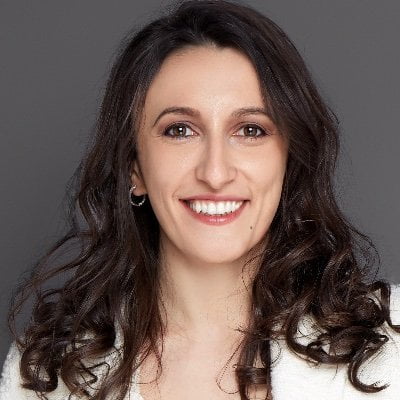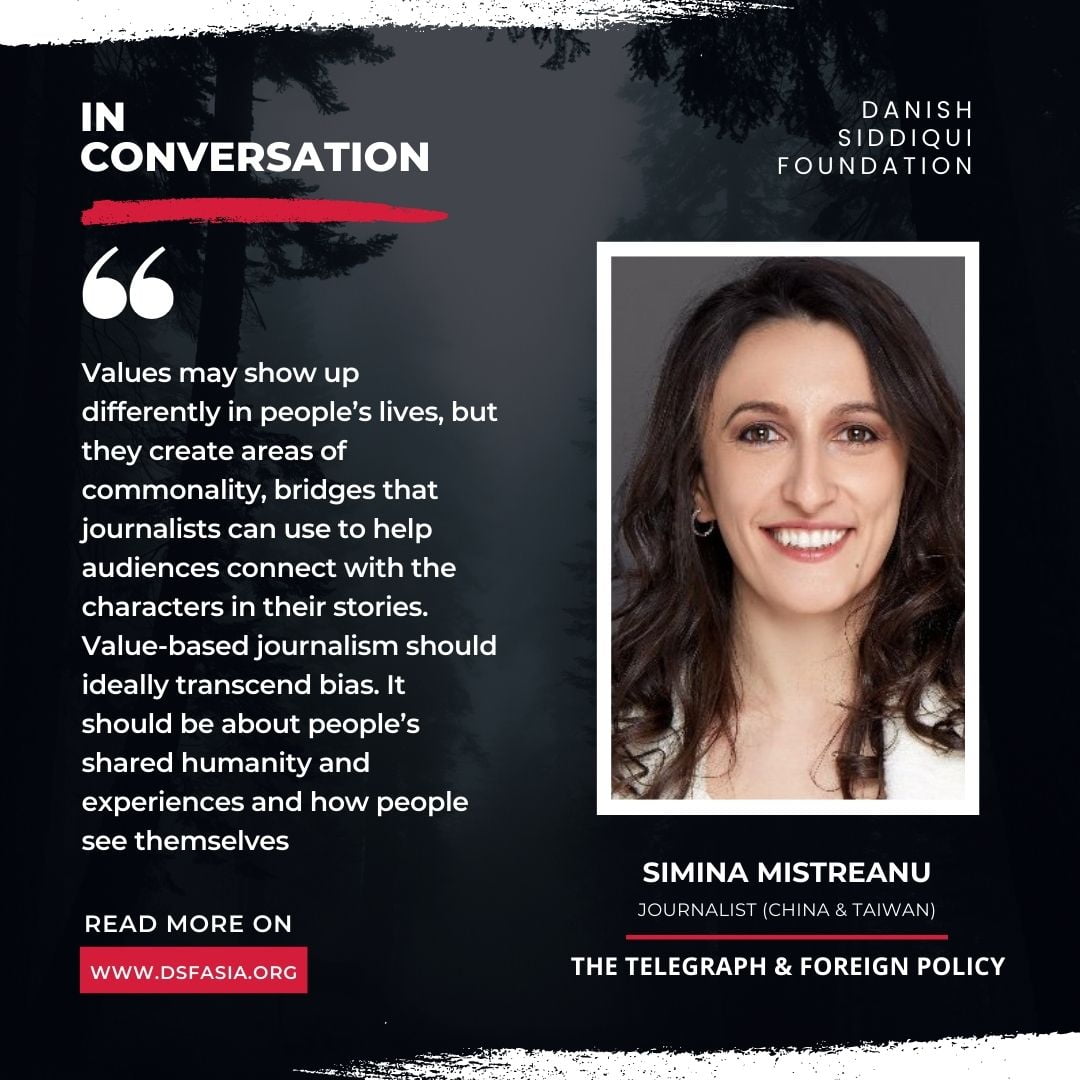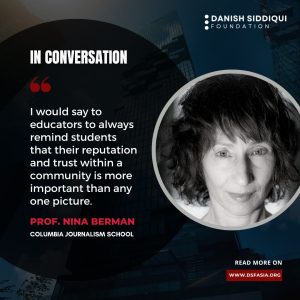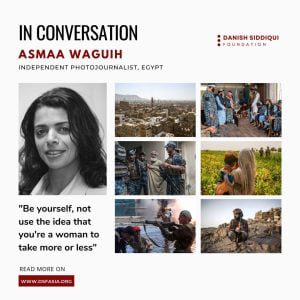
What inspired you to become a journalist?
I learned how to read when I was three by watching over the shoulder of my older sister, who was in first grade and was practicing reading. I don’t remember the process, but it’s what my parents told me. The result is that ever since I can remember, I’ve been reading stories, and I learned to look at life through the framework of storytelling. Around my junior year in high school, I realized I could make a living telling people’s real stories as a journalist.
What does value-based journalism mean to you?
Values create the thread of our shared humanity. Without sounding too esoteric, they are like anchor points for our consciousness – they reflect what we value in life. Values may show up differently in people’s lives, but they create areas of commonality, bridges that journalists can use to help audiences connect with the characters in their stories. If you are an office worker in Kansas, you may not know much about the Uyghurs. Still, you may understand the uneasy feeling of putting up with something unfair and unjust for a long time, a situation that keeps you up at night, and then suddenly deciding you will do something about it even if it involves taking a risk. That’s a story about self-empowerment – a value that many people cherish and can recognize in others. I was taught early in my career to always look for a central theme in every story: is it obsession, or transformation, self-empowerment, or standing up and doing the right thing, or sacrifice? These are essential values, and if journalists keep them in mind while working on stories, they can help make our work more powerful.
Why did you choose to specialize in China? Tell us about your experience so far.
Life brought me to China. I was working as a journalist in Portland, Ore., several years ago when I met my then-boyfriend, now-husband, who is American. I was months away from having to leave the U.S. per a requirement of my U.S. State Department-sponsored Fulbright program, and we both wanted to continue seeing each other. That’s when he suggested we move together to China, which I was unsure about at first, but it worked out.
Covering China is very challenging from many points of view. Access to sources has become increasingly difficult as the government continues to crack down on political freedoms. Physical access to China is also problematic, so many journalists who cover China, myself included, are now based outside the country. I think for a lot of us covering China, there is a sense that it’s an important story affecting almost everyone in the world, and we need to strive to do a good job telling it.
How do you deal with cultural differences and language barriers?
I moved to China without speaking the language at all. While I’ve studied consistently over seven years, I’ve also significantly benefitted from the help of talented Chinese colleagues working alongside me as researchers and interpreters. The Chinese government doesn’t allow Chinese nationals to work as correspondents; they can only function as researchers or producers supporting foreign nationals. It’s often a thankless and dangerous job for them. As correspondents and consumers of news about China, we owe Chinese journalists a huge debt of gratitude.
Another thing I try to do religiously is employing the scientific method of journalism, which I learned about in grad school. Essentially, you approach every story like a scientist would by forming a hypothesis, collecting data, and presenting the results – which is different from deciding at the onset what the story would say and reporting in that direction. I think the scientific approach can help journalists to avoid misconceptions and preconceptions, especially when they report in environments with cultures different than their own.
What has been your most challenging story?
One of the most challenging stories I’ve had to write while covering China was a personal essay about the disappearance of one of my closest friends, Chinese journalist Sophia Huang Xueqin. She was taken by authorities in her hometown of Guangzhou while on her way to the airport. She intended to board a flight to Britain, where she had received a prestigious Chevening scholarship from the British government to pursue a master’s degree. I’ve covered difficult stories in China throughout the 6.5 years I was there (I’m currently based in Taiwan), but this one felt like all of my worlds were intersecting in a terrible way. Sophia is a very inspiring journalist and a wonderful friend. She has aimed to practice her profession to the best of her ability, just like me and many other journalists I know – but for that, she was terribly sanctioned by the Chinese government. Now, she risks spending years in prison on accusations related to joining weekly meetings with friends at the home of her friend Wang Jianbing, who disappeared at the same time she did. All this remains mind-boggling and hard to comprehend.
And your most memorable stories?
One of my most memorable stories was a profile of a town in China’s eastern Shandong province where the government ran a pilot project for the country’s infamous social credit system. The story debunked a lot of misconceptions about what the social-credit system would be like. It was interesting seeing how people related to the concept – many were pragmatically ready to embrace it – and to understand the thinking of those designing it.
As an international journalist, do you feel preconceived notions about a country or an issue can result in bias while reporting? If yes, what can journalists do to minimize such bias?
Absolutely. The key to avoiding some of that bias is to go back to the scientific method and storytelling concepts and structures. Value-based journalism should ideally transcend bias. It should be about people’s shared humanity and experiences and how people see themselves, as opposed to preconceived notions about various groups.
Do you think female journalists face more challenges than male journalists? If yes, what are the challenges?
Yes. There is still a lot of sexism in the media industry and society. Journalists can experience discrimination in their careers based on gender, race, class, and nationality – the latter may be less talked about than the others. I admire projects that turn these concepts on their head, such as Al Jazeera’s excellent Contrast division, which is all-female, focused on people of color and people from the Global South. They do amazing, collaborative, award-winning work and extend opportunities to professionals who might otherwise be overlooked.
Where do you see digital journalism heading in the next five years?
It’s hard to say. I hope it will incorporate more storytelling, value-based journalism, new, innovative features, and diverse voices.
What would be your advice to young women journalists out there?
As women, we are often conditioned to want to please others. My advice for young female journalists would be to learn to trust their instincts and practice their profession according to their internal compass. Focus and fight only the important battles.
Disclaimer: The views and opinions expressed by those interviewed by the Danish Siddiqui Foundation, including all program participants, are solely their own current opinions regarding events and are based on their own perspectives and opinions. The views and opinions expressed do not necessarily reflect the views or opinions of the Danish Siddiqui Foundation, or the companies with which any program participants/interviewees are, or maybe, affiliated.




